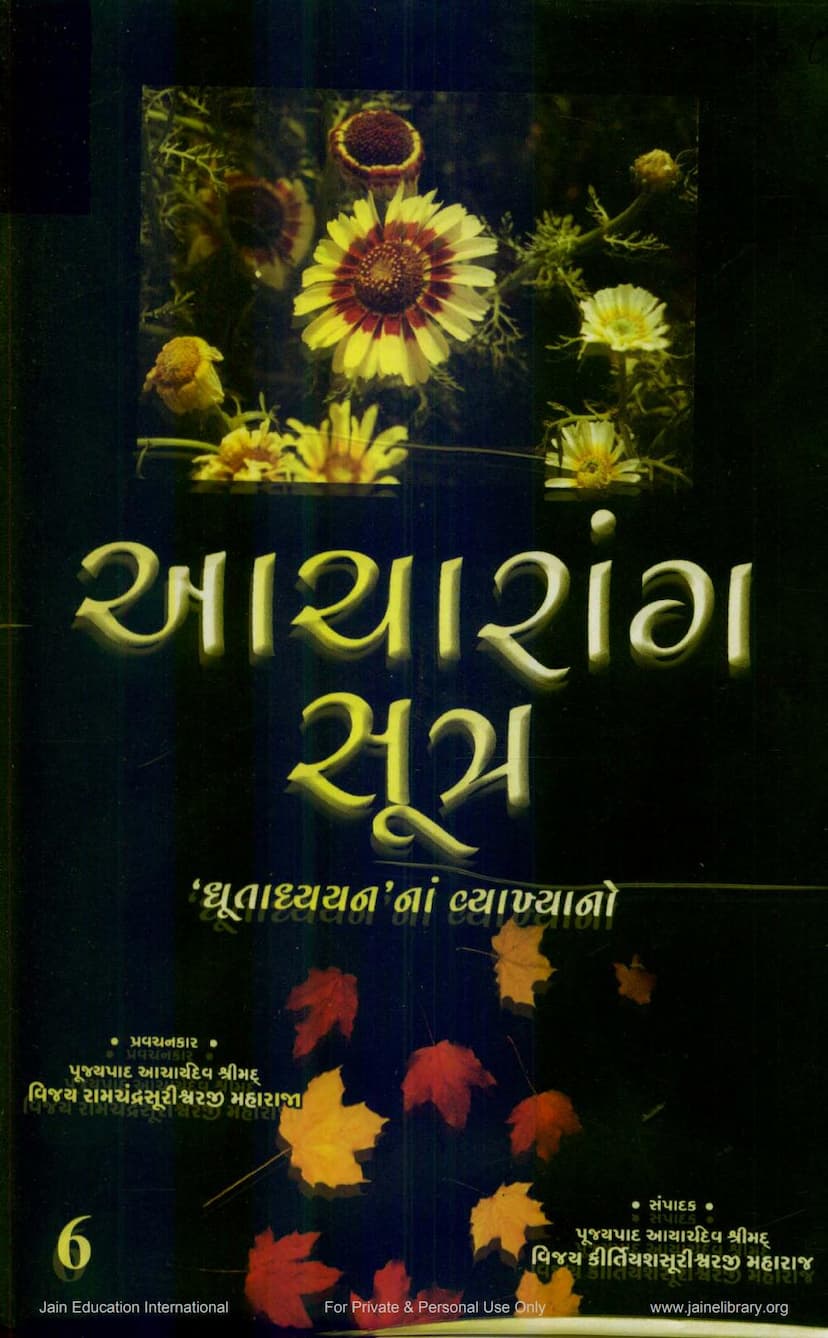Agam 01 Ang 01 Acharanga Sutra Part 06
Added to library: September 1, 2025

Summary
This is a comprehensive summary of the provided Jain text, "Agam 01 Ang 01 Acharanga Sutra Part 06" by Ramchandrasuri, published by Sanmarg Prakashan, focusing on the lectures (Vyakhyans) of Acharyadev Shrimad Vijay Ramchandrasurishwarji Maharaj on the Dhutadhyayana section of the Acharanga Sutra.
Overall Context:
This document is the sixth part of a series of lectures by Pujyapada Acharyadev Shrimad Vijay Ramchandrasurishwarji Maharaj, compiled as part of the Shri Nemichandrasuri Smriti Granthamala. The lectures focus on the Dhutadhyayana, a significant section of the Acharanga Sutra, which deals with ascetic practices and spiritual discipline.
Content Summary:
The book contains lectures numbered 95 through 116 (Part 06). The preface (Prastavik) highlights the following key themes covered in these lectures:
- Continuation of Suffering: Following the fifth part which described the intense suffering across different realms of existence, this part delves into the root causes of these sufferings.
- Root Causes of Suffering: The lectures extensively explain the nature of mithyatva (false belief), avirati (non-restraint), pramada (carelessness), kashaya (passions like anger, pride, deceit, greed), and ajnana (ignorance) as the primary sources of worldly suffering.
- Spiritual Insight vs. Ignorance: The teachings contrast the understanding of a Vitaraaga (one who has conquered passions) saint, who sees clearly and lives in spiritual bliss, with the state of souls trapped in ignorance and suffering.
- The Path to Liberation: The lectures emphasize the importance of understanding the insubstantiality of the material world and cultivating detachment (nirveda and vairagya) to embrace the path shown by the Jineshwara.
- The Role of a Spiritual Preacher: The discussions cover the duties and responsibilities of a spiritual preacher (Dharmopadeshak), stressing the need to guide people away from worldly desires and towards the path of the Jinas, without compromising core principles.
- The Nature of True Happiness: The essence of true happiness is found not in worldly pursuits but in spiritual discipline and detachment.
- Critique of Misguided Practices: The lectures address and correct misconceptions about spiritual practices, emphasizing that the true goal of Jain practices like charity (dana) is liberation from the cycle of birth and death, not worldly gains.
- Importance of Righteous Conduct: The lectures highlight the necessity of living according to Jina-ajna (teachings of the Jinas) and the importance of recognizing the ephemeral nature of worldly pleasures.
- Youthful Indiscretion and False Independence: The lectures touch upon the dangers of youthful recklessness and the delusion of false independence.
- The True Nature of Comfort: Even basic necessities like food and sleep are discussed as potentially leading to suffering if not approached with awareness and detachment, framing them as forms of roga (disease) when pursued excessively or with attachment.
- Upholding Jain Principles: The text stresses the importance of adhering to Jain principles without deviation and warns against those who try to distort or manipulate the scriptures for personal gain.
- The Purity of Truth: The lectures emphasize the need to actively protect and propagate truth, and the role of spiritual guides in maintaining awareness and vigilance on the spiritual path.
Key Themes and Concepts Explored:
- Karma Vipaka: The dire consequences of karma and the cycle of suffering across different life forms.
- Mithyatva (False Belief): The pervasive nature of wrong beliefs and their role in perpetuating suffering.
- Avirati (Non-Restraint): The lack of control over senses and desires as a cause of bondage.
- Pramada (Carelessness/Negligence): The destructive impact of negligence on spiritual progress.
- Kashaya (Passions): The detrimental effects of anger, pride, deceit, and greed.
- Ajnana (Ignorance): The fundamental obstacle to spiritual realization.
- Nirveda and Vairagya: The cultivation of detachment and dispassion towards worldly affairs.
- Jina-ajna: The paramount importance of adhering to the teachings of the Jinas.
- The Duty of a Spiritual Preacher: Guiding disciples, correcting misconceptions, and maintaining the integrity of the Dharma.
- The True Nature of Happiness: Happiness derived from inner peace and spiritual realization, not external possessions.
- The Danger of Misguided Independence: The pitfalls of thinking one can act without following spiritual guidance.
- The Transformative Power of Religion: How even materialistic pursuits can be viewed through a spiritual lens to aid in detachment.
Structure of the Lectures:
The summary of each lecture topic provides a glimpse into the discourse, covering philosophical concepts, ethical guidelines, and practical aspects of Jain spiritual life. The lectures aim to instill a sense of urgency and detachment from the material world to foster spiritual progress.
This summary provides a detailed overview of the content and themes present in the provided text, based on the chapter titles and introductory remarks.